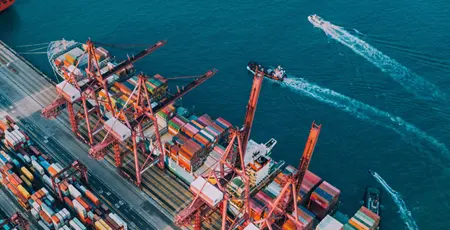Structural change
AMBS academics share views at climate conference.
The climate crisis is unprecedented and needs deep structural change to industries we depend on.
During his session Jonatan Pinkse, Professor of Strategy, Innovation and Entrepreneurship, discussed what an effective green recovery should look like. His answer was that a green recovery was ultimately about "how we are going to change mobility, how we are going to change industry, and how we are going to change our own behaviour".
He specifically discussed the multi-billion sums that governments across the world have pledged to the green recovery in the wake of COVID-19, and the particular challenges of enforcing green policies.
"When a green recovery builds on something that is already happening you can do implementation faster because everything is in place and you can pour more money into those schemes," he said. "But the downside of using existing programmes is that you are still doing what you used to do and you are not being ambitious enough. And right now the goals needs to change. The net zero goal needs to be central, whereas in the past green policies did not have climate change as central and policies existed for all kinds of other reasons."
He added that the world needed a raft of new policies. "The climate crisis is unprecedented and needs deep structural change to industries we depend on. Innovation in this context takes a lot of time but it’s not impossible, just look at the relative success of electric vehicles over recent years. Sometimes you have to put business in a position where there is no other choice and that needs bold policy."
Productivity
Bart van Ark, Professor of Productivity Studies, and Elvira Uyarra, Professor of Innovation Studies, discussed whether greening the economy can drive productivity. They were also joined for the session by Lauren Pamma, Programme Director at the Green Finance Institute, and Kevin Lambert, Resource Efficiency Lead at Manchester Growth Company.
Professor van Ark conceded that greening the economy was a complicated topic, not least in terms of its impact on business performance. Professor Uyarra added that the public sector also played a key role in terms of providing a “sound, coherent, stable and credible” environment for public policy that is long-term and which helps drive private sector investment.
“The amounts of investment required to meet 2050 targets are huge in areas such as transport and buildings,” she said. “What are the technological solutions that can support the decarbonisation of transport? How do we know which activities are sustainable in terms of supporting the transition? And how do we guide investment?”
The climate crisis is unprecedented and needs deep structural change to industries we depend on.
Bottom line
Paolo Quattrone, Professor of Accounting, Governance and Society, hosted a thought-provoking session discussing the shift to value-added accounting and how environmental impacts can become part of the bottom line.
He began the session by asking a deliberately provocative question as to whether accounting can save the world. “I do not know whether accounting can save the world, but it can create the conditions for saving the world. The reason is that most of the social and environmental problems that we have are related to the production of services and goods, and the externalities that this production generates.
"Accounting is actually a wonderful framework to understand how services and goods are provided, what inputs we have, how we account for them, what values we generate and how we distribute value. We tend to forget that."
During the session he reflected on the current structure of the income statement, asking whether it was as much a “political” statement as an income statement, and discussed how it was drawn up in the interests of one very specific stakeholder, namely the shareholder.
Instead he suggested a new form of income statement which included a small but very important modification. “How about a line which accounts for provisions to a fund for nature? Why not create a value added statement for nature which reflects all the externalities that are created when you produce something?”
A team of experts at AMBS has published research, commissioned by the Financial Reporting Council (FRC), to explore how leading companies are using scenario analysis to disclose climate-related risks for their businesses.
The research indicates that many businesses are uncertain of the effects of climate change on their organisation and argues that mapping out these uncertainties now will put businesses in a better position to mitigate any potential consequences associated with climate change.
The research highlights the various approaches companies have adopted, instances of good practice, typical challenges faced, and the common steps taken to conduct climate-related scenario analysis. The work forms part of the activity undertaken by the Centre for the Analysis of Investment Risk (CAIR) at AMBS, which provides research expertise on wide-ranging aspects of investment decision-making and governance.
Leading ESG and Sustainability
Discover the challenges that businesses face and explore the ESG influenced transition to a net-zero economy.
Outcomes
Dr Yasmine Chahed, Visiting Research Fellow at AMBS, said: “Efforts to limit global warming vary across the world’s nations and businesses have to prepare for many possible outcomes and eventualities. That’s why projects like this are so important in helping to shape future regulatory strategy, and how that’s delivered. The climate challenge is huge and scenario analysis is critical in tackling this issue, and in facilitating the transition to a greener economy.
"Our research hammers these points home and indicates that many businesses are uncertain of the effects of climate change on their organisation. It’s clear, then, that mapping out those uncertainties now will put businesses in a better position to overcome the obstacles that lie ahead."
Scenarios
Professor Paolo Quattrone, Director of CAIR, added: "It’s clear that dealing with future scenarios around the climate crisis needs to be baked into a company’s strategic approach. What will increase your ability to deal with the unknown relates to how you govern the process of exploration and sense-making of the future. The research has confirmed that governing the process of interaction among teams and communication among functions is key in making sense of the uncertainties surrounding the effects of climate change on businesses."
Co-investigator Dr Robert Charnock added: “What the research showed first and foremost is that companies acknowledge that climate change will impact their sector and business model. Exactly what those effects will be still remains unclear to many. That’s where scenario analysis comes in, as it helps assess and plan for uncertain futures.
"The companies with the most mature approaches had developed these by going through multiple iterations, where each of their climate scenario analyses built on the lessons learned and skills developed during previous exercises."
Importance
Professor Fiona Devine, Head of AMBS, said: "The climate emergency is more pressing than it’s ever been, and conducting research in this space is vital for the future prosperity of businesses, particularly as premium listed companies will now need to report against the taskforce on Climate-related Financial Disclosures (TCFD) recommendations in their annual reports. We’re proud to be working with the FRC on such an important initiative, and to be carrying out such work in this area on an ongoing basis."






